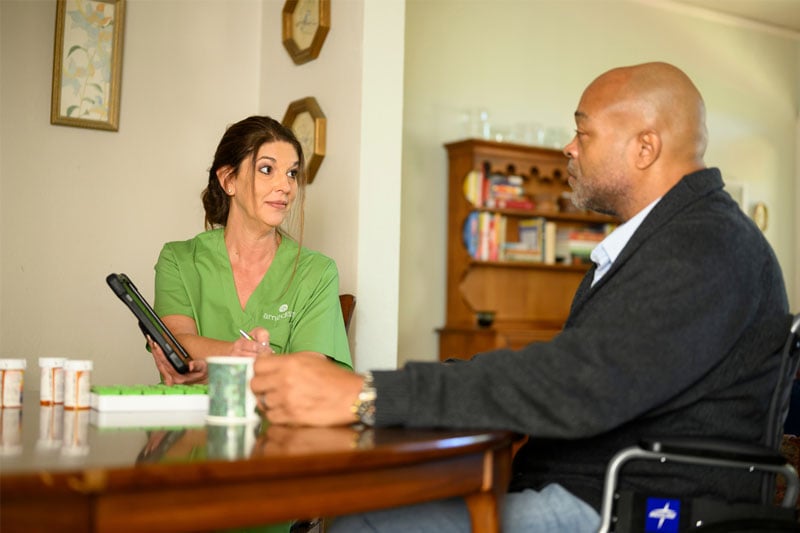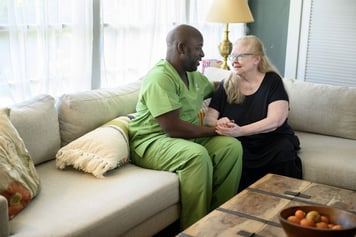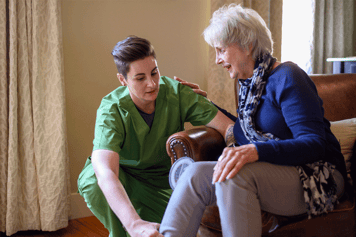If you, an aging parent or other loved one are facing serious health challenges and have been given a terminal diagnosis, you may consider hospice care for support. Your healthcare provider may have even recommended that you or a loved one be referred for hospice services. But how do you know that it’s time for hospice?
Figuring out when to call hospice can be overwhelming, but there are some key signs that can help you know it’s time to seek hospice care. In this article, we'll examine eight signs you should be aware of to help guide your decision.
Hospice: The Basics
To understand these signs, it’s important to first know what hospice is, and how it works.
Hospice care is supportive care for people who have a terminal diagnosis. It focuses on the comfort and quality of life for patients whose physician has certified they have a life expectancy of six months or less.
Patients who choose hospice have decided to decline further aggressive treatment to cure their illness. Instead, they can receive nursing care, hospice aide care, medical social worker and spiritual support, bereavement and emotional support and other services from an interdisciplinary team of healthcare providers. Respite care is also available to help support caregivers who may be overwhelmed or need a break.
This care is provided wherever the patient calls home — whether their residence, a family member’s home, a nursing home or other location. It can also be provided in the hospital or at an inpatient hospice facility depending on the circumstances.
Some of the most common terminal diagnoses for patients receiving hospice care are:
- Cancer
- Heart disease
- Lung disease
- Alzheimer’s disease and other forms of dementia
- Stroke
- Liver disease
- Kidney failure
- HIV/AIDS
- ALS (amyotrophic lateral sclerosis)
Eight Signs it’s Time for Hospice
In the confusion and stress of serious health conditions, it can help to know the common signs that it may be time for hospice, well before they start to appear. These signs are typical no matter what diagnosis a person is living with or how old they are.
If you’re caring for an aging person, it’s important to recognize that aging can be a difficult process for many people to accept. Many older adults associate illness with loss of independence or becoming a burden on loved ones. This may be why they don’t always tell you how they’re really feeling.
As a caregiver, it may be up to you to recognize the signs your loved one is declining and the need for a different type of care. Understanding potential signs helps reduce anxiety and allows you to honor your loved one’s wishes.
Many families wait to call hospice until the final days and weeks of their loved one’s life. In fact, 25% of Medicare patients who received hospice in 2021 only received it for five days or less. [1] But if the patient is eligible, they can receive specialized care, pain and symptom management, medications, medical equipment and supplies related to the terminal illness months earlier. People who choose hospice earlier in their terminal diagnosis often report higher satisfaction with their treatment. [2]
So how do you know when it’s time for hospice for you or a loved one?
1. Treatment is no longer working and/or aggressive intervention is no longer wanted
When a terminal illness has been worsening, sometimes treatments no longer improve symptoms and quality of life, and the treatment itself can become a burden. Frequent visits to the doctor and medications that cause side effects may no longer be helpful enough to warrant continuing treatment.
2. A doctor has told you they believe life expectancy is six months or less
This is a basic requirement to be enrolled in hospice care. If the terminally ill person continues to meet the eligibility requirements, hospice can continue providing care until the end of life.
3. A person's health is worsening
Frequent trips to the hospital or doctor’s office because of complications related to a terminal illness can be a sign that hospice support is appropriate. This is especially true if worsening symptoms of the illness like shortness of breath, pain or nausea are affecting quality of life.
“Sometimes people only think hospice is an option if they have cancer or have been told they only have days to live,” says Sheena Cupid, DNP, MSN-Ed, RN, CHPN, Senior Director of Learning and Development at Amedisys. “In reality, we can help much earlier, and this is essential in establishing the patient's end-of-life care goals.” Health care providers determine eligibility based on several factors, including the patient’s overall prognosis and their specific goals of care.
4. Eating or drinking are challenging
A person may have decreased appetite, pain or nausea that is interfering with their ability to eat and drink. This is often a big concern for family members, who may be anxiously encouraging the intake of food and water. With many terminal illnesses, it is normal for the body to have a decreased need for nutrients, and lack of appetite is a common symptom. Rapid weight loss may also occur.
5. The number of hours of sleep has increased
An increase in the amount of time sleeping throughout both the day and night is another key sign that is commonly observed with a terminal illness. This can include increased sleepiness and inactivity even while awake.
6. There have been noticeable behavior changes
If you’ve noticed behaviors in an aging loved one that are out of character and cause concern, take note. This can include increasing problems with mental clarity, confusion and forgetfulness, or even just irritability or restlessness. Communication may become challenging.
People with cognitive deficits or advanced disease process may feel confused or agitated, even combative at times. They may not know where they are or what’s happening around them. Some people perceive things that aren’t there (hallucinations) or have false beliefs (delusions).
7. Self-care activities are difficult
Known as activities of daily living, self-care activities include tasks like feeding oneself, using the bathroom, bathing and dressing independently. If an otherwise independent person now requires hands-on assistance with these tasks, it can be a sign that hospice support would help.
8. Caretakers and loved ones are overwhelmed
One of the most important support systems a person can have at the end of life is family, friends and other caregivers. Hospice care is designed to support everyone involved in a patient’s life, not just the person with the terminal diagnosis.
If you’re a caregiver, your stress levels may escalate as your aging loved ones need more help. It is an act of love to admit you need caregiver support and use all the resources available to provide the best care for the special people in your life.
I think it’s time for hospice, now what?
If this list has helped confirm your belief that it might be time for hospice care, the first step is to have an open conversation with your family and other loved ones. Sometimes this is easier with the support of your healthcare provider, who can help explain available options and whether further treatment is improving a person’s quality of life and meeting their goals.
Ultimately, there is no right or wrong answer to the question of whether you should choose hospice now or down the road. It is a very personal decision. It’s also important to know that if you do choose hospice, you or your loved one can change your mind at any point.
Having a Conversation About Hospice
If you’re a caregiver, learn as much as you can about end-of-life care options such as hospice so that you can answer questions and offer reassurance to your one. You may want to talk with hospice agencies, so you understand the options and eligibility requirements.
"Often times, the person begins mentioning subtle things to their families and caregivers," says Cupid. "It's important to begin paying attention to the subtlest comments and then openly discussing the person’s wishes and what matters to them. Keywords we often hear that are cues for further conversation include, 'I'm tired' or 'I just want one day without pain or to sleep comfortably.’”
A member of the hospice care team may be able to talk with you and your loved one and help decide if hospice is the answer. “If the family thinks hospice might be the next step but their loved one is resistant, or vice versa, it can help to have the hospice team meet with the family,” Cupid advises. “We can provide education and share the message, ‘We’re here when you’re ready.’”
Here are some tips to help have a successful conversation about hospice:
1. Start Talking Early On
Talk to your loved ones about their preferences for end-of-life care, ideally before their health is declining. “It’s about open and honest communication,” says Cupid. “Ask open-ended questions about what hospice means to them and educate them about hospice services and benefits.”
These conversations can be difficult, and your loved one may not be immediately receptive. That’s why it’s important to revisit the subject more than once. If you have these talks before your loved one’s health declines and they choose hospice, they will receive better care that aligns with their goals, and you’ll feel better about end-of-life decision-making.
2. Offer a Listening Ear
It can take time to understand the benefits of hospice care. Listen to your loved ones’ concerns and empathize with the difficult decisions they are facing. Emphasize that hospice care provides the gift of a dignified and meaningful death and give them time to process their options.
3. Ask to Attend a Doctor's Appointment
If your loved one agrees to have you join them at the appointment, share your concerns with their doctor and ask to have a conversation about hospice.
You are in a unique position to understand when your aging loved ones need help and advocate for their wishes. With your help, they can have the best quality of life possible at the end of life.
How to find the right hospice care
Insurance coverage, including Medicare and Medicaid, fully covers hospice if you have been certified as eligible by a physician. Private insurance carriers will need to contact the insurance company to discuss coverage for hospice care. Medicare-certified hospice providers offer four levels of hospice care depending on your needs and will work with you to arrange the best approach to your care to improve your quality of life.
Ready to have the hospice conversation and looking for support? Download our e-book below, “How to Talk to Your Family Member About Hospice,” for more insights on the best approach.
Deb Gallaher, MSN, MBA, RN, NE-BC, CHPN, is a Senior Hospice Clinical Education Specialist for Amedisys. She has 10 years of experience in hospice and is passionate about sharing her insights on high-quality care.





